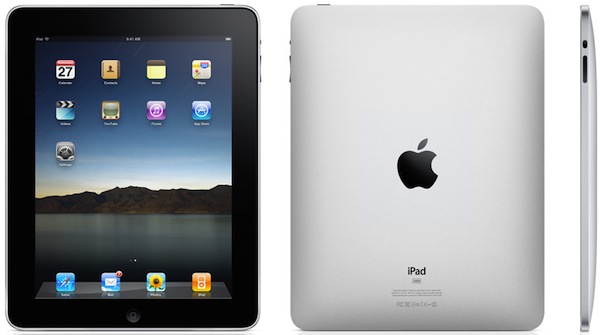
HP counters Dell's 3PAR acquisition bid with 33% higher offer
One week after Dell announced its intention to acquire virtualized storage company 3PAR for $1.15 billion, HP announced it has submitted a counter offer of $1.6 billion to acquire the company.
HP had actually made a private offer to acquire 3PAR previously, but the company passed on it, accepting instead Dell's $1.15 billion share buyout bid. Monday's counteroffer from HP was public.

New industry meetings over net neutrality being hosted by lobbyists
While much of the focus has been on Google and Verizon when it comes to net neutrality as of late, the Wall Street Journal has reported that lobbyists began a new set of talks among a much wider group on Wednesday.
The Information Technology Industry Council is a lobbying firm which represents dozens of companies, including Apple, AOL, Cisco, HP, Microsoft, Nokia, and RIM among others. Reports indicate Microsoft is in attendance as is Cisco. AT&T and Verizon are also involved in the negotiations, but Google is not.

Is Apple the real U.S. PC market share leader -- or soon will be?
The answer to the question depends on how iPad is classified and how the shipments add up combined with Macs. Is iPad a PC, like Windows tablets or low-powered netbooks? The definition is sure to generate controversy because of what's at stake -- which manufacturer is market share leader in the United States.
Late yesterday, I contacted Gartner and IDC, which both measure global PC shipments. But only Gartner responded to my question about how iPad is classified. It is clear from preliminary second quarter PC shipment data that neither analyst firm calculated iPad with PC shipments (Gartner explicitly explained so in its press release: "Gartner's PC group does not track media tablet sales in this PC shipment data, so iPad sales are not included in these results.") A Gartner spokesperson responded to my question about classification: "We don't have data for this category yet. We hope to have some stats for this category at some time shortly."

Comcast-NBCU merger opponents make one last push at FCC
The final comment period before the Federal Communications Commission makes its ruling on whether or not to approve the Comcast-NBC Universal merger ended on Thursday, and opponents made one last effort to stop it in its tracks.
Comcast fought off those complaints, calling them "nothing more than preexisting or industry-wide grievances" that should not be part of the decision to approve the merger. It also accused some of those attempting to put additional conditions on the deal were attempting "to foist unprecedented and onerous burdens on the combined entity."

Scitable pulls scientific research out from behind the paywall
I experienced quite a personal shock when I aged out of having access to my university's research portal. The vast catalog of peer-reviewed journals, empirical studies, and thorough analytical research I had at my disposal as a student was boarded up behind a distinct paywall not long after I finished school.
The fast-moving news, blogs, forums, and free tools I had been taught to eschew were suddenly all I had. My principal option (besides re-enrolling in school) was to become a member of a research service like LexisNexis or NewsLibrary; but those portals cost several hundred dollars a year each.
I suddenly recognized that the best information on the Web is not free.

Nokia beefs up mobile developer support with Motally buy
In a move likely aimed at putting it on a more even keel with Apple's App Store, Nokia on Friday announced it had acquired mobile analytics firm Motally. Terms of the deal were not disclosed, and the acquisition is expected to complete before the end of the third quarter.
Motally's metrics help developers understand how their users are interacting with their applications. Nokia would adapt the company's technologies to work with its Symbian platform as well as Meego, Qt, and Java, although it plans to continue serving current customers.

'Innocent Infringer' copyright defense for downloaders goes to U.S. Supreme Court
The case of Whitney Harper, the first defendant in a peer-to-peer copyright infringement suit to use the "innocent infringer" defense, was submitted to the U.S. Supreme Court in the form of an Amicus brief Thursday by a group of "Cyberprofessors" led by digital copyright reformer Professor Charles Nesson.
Nesson's group, calls this the "next generation of P2P lawsuits."

40 Windows apps affected by critical security flaw, researcher claims
A Texas-based researcher claimed he had discovered that about 40 different Windows apps, including the Windows shell, suffer from a critical vulnerability that could open up users to attacks by hackers. The flaw was originally discovered in iTunes for Windows, and was patched by Apple four months ago with iTunes 9.1.
Rapid7 chief security officer HD Moore detailed his findings to Computerworld in an interview on Wednesday. He said a wide range of applications are affected, and it was found while looking into another flaw involving Windows shortcuts, which Microsoft patched in an emergency update.

Toshiba's hard drive breakthough could herald mega-capacity drives
Toshiba said Wednesday that it had made a breakthrough in hard disk design that will allow hard drives to have much higher capacities than what is currently possible today. The research is in something called bit-patterned media, a magnetic storage technology.
The recording surface is broken up into tiny magnetic bits, each of which can hold a single bit of data. The bits are made up of several grains, which are organized in rows. This organization is what makes it possible for data to be found easily.

LightSquared initiates L-band spectrum shift critical to new 4G LTE/Satellite network
LightSquared, the company responsible for the first wholesale hybrid Satellite/Cellular network that many expect will power the 4G services of at least one of the four major wireless carriers in the U.S., announced Wednesday the beginning of the wireless spectrum shift that will ultimately make its network possible.
In a December 2007 agreement, SkyTerra (now LightSquared) and mobile satellite service provider Inmarsat arranged a system that would allow the L-band spectrum to be re-banded for use in both MSS (satellite) and ATC (terrestrial) services.

RIAA, music industry step into net neutrality debate once again
In a letter to Google chief Eric Schmidt, RIAA and 12 other music industry groups asked that any proposal on the issue of net neutrality be specific in taking steps to combat copyright infringement and child pornography. The inclusion of pornography in the industry's request is somewhat unusual considering none of the groups listed are active participants in any anti-pornography efforts.
The groups feel that any proposal should permit ISPs to take action against these issues. While the proposal put forth by Google and Verizon does address 'unlawful content,' it is not specific as to what that may entail.

Is Facebook stifling innovation?
The answer could prevent startups like foursquare from ever coming to be.
I predict that social geotagging service "Places" will be Facebook's TCP/IP moment. During the 1990s, Microsoft started to aggressively integrate previously standalone features into Windows, with TCP/IP and disk compression being notable. The features' integration made products from smaller companies -- many of them startups -- redundant. Microsoft didn't necessarily offer something better, but something free and easily accessible as part of Windows.

Intel seeks to change cybersecurity with $7.6B McAfee acquisition
Intel Corporation Thursday morning announced that it will acquire security software and management company McAfee Inc. for $7.68 billion in cash. Intel says the move reflects the changing security climate as more non-PC devices connect to the Internet, like cars, TVs, and medical equipment.
"With the rapid expansion of growth across a vast array of Internet-connected devices, more and more of the elements of our lives have moved online," said Paul Otellini, Intel president and CEO. "In the past, energy-efficient performance and connectivity have defined computing requirements. Looking forward, security will join those as a third pillar of what people demand from all computing experiences."
Intel says there needs to be "a fundamentally new approach involving software, hardware and services," for the increasingly connected world.

Facebook adds check-in feature with "Places," teams up with likely competitors
Leading social network Facebook Wednesday announced Facebook Places, a service which adds location awareness to the service's mobile experience.
The service launches tonight in the United States as a part of the Facebook application for iPhone, and on the HTML5 touch.facebook.com, and users will have the ability to "check in" to their locations similar to the way users on Foursquare, Gowalla, and Brightkite can, and likewise they can find out who and what is available around them.

FCC says broadband ISPs routinely exaggerate connection speeds
The Federal Communications Commission has said that ISPs are not truthful in advertising broadband speeds, often choosing to use maximum connection speeds in attracting customers. The finding came as part of a larger study on broadband performance released this week.
While the advertised speeds have averaged in the range of 7 to 8 Mbps, actual speeds are roughly half that. This gap was found to be about the same across all technologies, including cable, DSL, and fiber to the home. The FCC argued that the gap may cause confusion among consumers as the speeds determine the consumer experience.